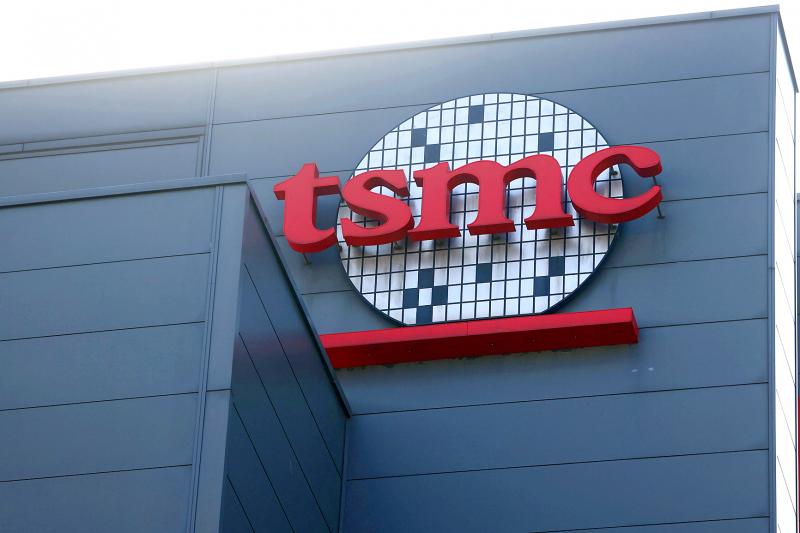Taiwan Semiconductor Manufacturing Co’s (TSMC, 台積電) board of directors has approved a plan to invest up to ¥18.6 billion (US$177.7 million) to set up a fully owned subsidiary in Japan to expand its 3D semiconductor material research, the company said yesterday.
The subsidiary is to begin operations this year, company spokeswoman Nina Kao (高孟華) said.
The announcement comes amid escalating geographic tensions worldwide, and highlighted TSMC’s strategic importance in global supply chains.

Photo: Ann Wang, Reuters
The Japanese government has reportedly been coaxing TSMC, the world’s largest contract chipmaker, to build a factory in Japan.
Japan-based clients contributed about 5 percent to TSMC’s NT$1.34 trillion (US$47.2 billion) revenue last year, company data showed.
The Nikkei Shimbun on Monday reported that TSMC is planning to invest about ¥20 billion to set up a research and development facility in Ibaraki Prefecture, while also looking at establishing a new company in Japan.
The new facility would focus on advanced semiconductor packaging and testing, the report said, adding that TSMC is considering installing a production line in Japan.
TSMC did not comment on the Nikkei report.
The board yesterday approved capital appropriation of US$11.79 billion for next quarter, which would be used mainly for factory construction, and installing and upgrading advanced technology capacity, as well as research and development, TSMC said.
To finance its capacity expansion and related expenditures on pollution prevention, the board approved a plan to issue local unsecured corporate bonds of up to NT$120 billion, and to act as a guarantor to its subsidiary TSMC Global Ltd’s issuance of US dollar-denominated senior unsecured corporate bonds of up to US$4.5 billion, it said.
The board also approved a proposal to distribute a cash dividend of NT$2.5 per share. That represents about a 45 percent payout ratio based on earnings per share of NT$5.51 during the quarter ending on Dec. 31.
It also approved the payment of performance-based bonuses and profit-sharing rewards of approximately NT$69.51 billion to employees for last year’s work.
Earlier yesterday, TSMC said that its revenue expanded 22.2 percent to NT$126.75 billion last month, compared with NT$103.68 billion a year earlier.
Last month’s revenue was the highest level since September last year.
On a monthly basis, revenue rose 8 percent from NT$117.37 billion.

CHAOS: Iranians took to the streets playing celebratory music after reports of Khamenei’s death on Saturday, while mourners also gathered in Tehran yesterday Iranian Supreme Leader Ayatollah Ali Khamenei was killed in a major attack on Iran launched by Israel and the US, throwing the future of the Islamic republic into doubt and raising the risk of regional instability. Iranian state television and the state-run IRNA news agency announced the 86-year-old’s death early yesterday. US President Donald Trump said it gave Iranians their “greatest chance” to “take back” their country. The announcements came after a joint US and Israeli aerial bombardment that targeted Iranian military and governmental sites. Trump said the “heavy and pinpoint bombing” would continue through the week or as long

TRUST: The KMT said it respected the US’ timing and considerations, and hoped it would continue to honor its commitments to helping Taiwan bolster its defenses and deterrence US President Donald Trump is delaying a multibillion-dollar arms sale to Taiwan to ensure his visit to Beijing is successful, a New York Times report said. The weapons sales package has stalled in the US Department of State, the report said, citing US officials it did not identify. The White House has told agencies not to push forward ahead of Trump’s meeting with Chinese President Xi Jinping (習近平), it said. The two last month held a phone call to discuss trade and geopolitical flashpoints ahead of the summit. Xi raised the Taiwan issue and urged the US to handle arms sales to

State-run CPC Corp, Taiwan (CPC, 台灣中油) yesterday said that it had confirmed on Saturday night with its liquefied natural gas (LNG) and crude oil suppliers that shipments are proceeding as scheduled and that domestic supplies remain unaffected. The CPC yesterday announced the gasoline and diesel prices will rise by NT$0.2 and NT$0.4 per liter, respectively, starting Monday, citing Middle East tensions and blizzards in the eastern United States. CPC also iterated it has been reducing the proportion of crude oil imports from the Middle East and diversifying its supply sources in the past few years in response to geopolitical risks, expanding

Pro-democracy media tycoon Jimmy Lai’s (黎智英) fraud conviction and prison sentence were yesterday overturned by a Hong Kong court, in a surprise legal decision that comes soon after Lai was jailed for 20 years on a separate national security charge. Judges Jeremy Poon (潘兆初), Anthea Pang (彭寶琴) and Derek Pang (彭偉昌) said in the judgement that they allowed the appeal from Lai, and another defendant in the case, to proceed, as a lower court judge had “erred.” “The Court of Appeal gave them leave to appeal against their conviction, allowed their appeals, quashed the convictions and set aside the sentences,” the judges